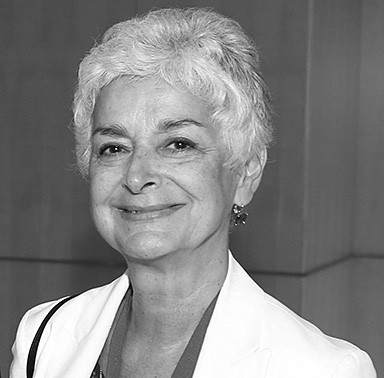John Molson executives in residence reflect on their contributions to the university community
 Louise Champoux-Paillé
Louise Champoux-Paillé
 Corrine Charette
Corrine Charette
The John Molson School of Business (JMSB) executive in residence plays a special role at Concordia. Accomplished authorities in their fields of work, executives in residence use their extensive experience to help support students and faculty.
“Concordia respects, recognizes and leverages the expertise of those who have already had a long and fruitful career,” explains Corrine Charette (Sc 75, LLD 11), who held the position from 2018 to 2020.
“The executive in residence draws on experience and knowledge to contribute to JMSB and the broader university community.”
Louise Champoux-Paillé, who took on the role last spring, agrees. “Concordia’s culture is really to take wisdom from wherever it comes. The inclusive culture makes it a great place for me to contribute.”
Charette’s work centres on IT and data governance, while Champoux-Paillé focuses on equal opportunity for women in business.
‘Universities are data mines of information’
“My career has really revolved around the question: How do you leverage technology to move forward the missions of an organization, whether it be a business, the government or a university,” Charette explains. “How do you take the available technology — which changes and evolves daily — and use it to solve problems?”
Before becoming executive in residence at Concordia, Charette had a long career in technology and data management. Among other important positions she has held, she was chief information officer for the Government of Canada for six years.
“In taking up my residency, I had roughly four big missions,” she explains. “First, I was asked to join the Digital Strategy Steering Committee. It has really been a driver in updating and adopting digital approaches across the university.”
The second was to help drive and support the work of data governance at Concordia.
“Universities are data mines of information which need to be harnessed for evidence-based decision-making. I’ve been working with others at the university to help drive data governance forward and produce new, beneficial policies.”
Charette says her third mission was to support students wherever she could, at the John Molson School of Business and in other faculties.
“This often involved mentorship. I also taught a course on project management. Then I created a course for eConcordia on the management of digital privacy, which is now being offered for the second time.”
Finally, she worked with Concordia’s District 3 innovation hub, which helps students and others grow their startups into sustainable businesses. “I mentored students and student teams. I helped them utilize technological resources to move their ideas forward.”
Céline Martineau (BEng 2020) was one of Charette’s students.
“Corinne helped me work through ideas about my potential career path. She helped inform me about the workforce, build my confidence and prepare me for interviews,” Martineau shares.
“In working with her, I learned to channel my enthusiasm and energy in productive ways. I came to appreciate the value of my own skills. Especially since the field of engineering is still so male dominated, I was grateful for the perspective she offered.”
Women’s equality in business
Champoux-Paillé has been widely recognized for a decades-long career in business and her championing of women’s equality. Like Charette, she has been productive in multiple domains during her residency.
“There was, of course, already an abundance of excellent scholarship produced by the John Molson faculty long before I arrived,” Champoux-Paillé says. “There are also many women faculty members. My job has largely been to use my experience and knowledge to help allow the fruits of this research to be realized in terms of concrete change.”
Since taking up her role, she has co-written multiple articles with Anne-Marie Croteau, dean of the school.
“We recently published an article about the importance and success of female leadership during the pandemic in The Conversation and in Premières en affaires,” she says.
In September she participated in a conference hosted by the Banque Nationale de Paris, where she spoke about the presence of women in business.
“I’ve also collaborated with 10 Concordia professors on a think tank on female leadership. We’re working on making the research they have done on women in business and leadership better known,” Champoux-Paillé adds.
“I provide weekly updates to our shared database of information on these topics. I keep track of the research being done on women in leadership and help keep my colleagues up to date. Plus, I help strategize ways to see more equal representation of women in science, technology, engineering and math (STEM) fields.”
Champoux-Paillé points out that working during the COVID-19 pandemic has had its difficulties, but it has also provided an opportunity to promote an appreciation for the work that many women do.
“Family and childcare responsibilities still fall disproportionately to women. I have such an admiration for my women colleagues who have effectively and gracefully balanced teaching, research and family obligations throughout the pandemic.”
Concordia community
For Martineau, having access to the executive in residence was a huge plus during her undergrad.
“Getting to work with Corrine and hearing about her experience is so important to students. Her insight helps put everything we learn and all the advice we receive into context.”
From Charette’s perspective, the Concordia community is an extremely collegial, collaborative, open-minded and forward-thinking place.
“The university values diversity of experience. They’re always looking for new ideas and better approaches. It’s a privilege for me to be part of the Concordia family and contribute in the ways that I can,” she says.
Champoux-Paillé echoes a similar sentiment. “At the John Molson School of Business, but elsewhere at Concordia as well, there’s a culture of promoting research by and related to women. It’s a great place to work.”
Find out more about Concordia’s John Molson School of Business.




